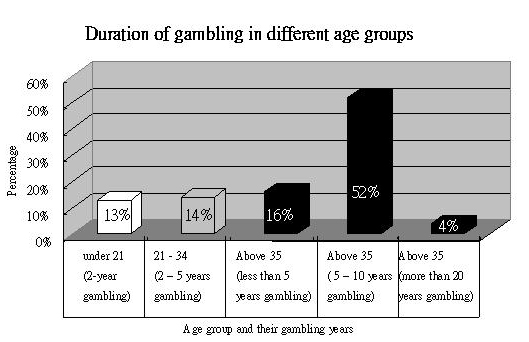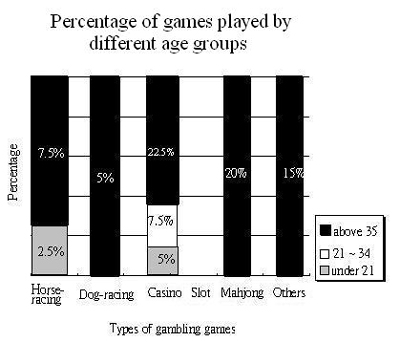
Pathological gamblers in "Oriental Las Vegas"
Lisboa Casino, which attracts thousands of people everyday, has chronicled the Casino development in Macau
"No local citizens gamble." Is that a true statement or a myth about Macau people?
In order to understand how people in Macau think of gambling, this group of reporters conducted telephone interviews of 80 local people aged between 19 to 53 on April 10 and 11. The findings show that local people do gamble; 57.5 percent of the interviewees said that they have gambled while 42.5 percent have never done so. 13 percent of the interviewees are under 21 years old and have been gambling for two years. In the age group of 21 to 32, 14 percent of them have been gambling for two to five years. For people who are above 35 years old, 16 percent of them have been gambling for less than five years, 52 percent of the people have been gambling for five to 10 years and 4 percent of the people have been gambling for more than 20 years. All the interviewees' monthly incomes are around MOP10,000-MOP15,000.
All the interviewees seem to understand and acknowledge the effect of gambling on their emotions, family relations and financial conditions, but none of them think that they will get rid of it in their life in the future. 90 percent of them said that they gamble because it is a kind of entertainment for them and they can make some easy money out of gambling. The remaining 10 percent of the people have other reasons for gambling, such as daily habit and so on.
Besides the effect of emotion, 15 percent of them admitted that gambling has also affected their family relationship and caused them to suffer from financial problems. Two interviewees said that they have quit gambling for five years because of their families and their new born babies. 90 percent of the interviewees claimed that they have never borrowed money from others for gambling, only 10 percent of the interviewees said that they have borrowed money from the family or friends. All the interviewees responded that they have never obtained money from money lenders for gambling. Although 85 percent of the interviewees think that gambling has a certain effect on their emotions, none of the interviewees said that news reports about gamblers who committed suicide will have an effect on them in quitting gambling.
The telephone survey shows that nearly 70 percent of the gamblers are above 35 years old and around 50 percent of them have been gambling for around 10 years. Therefore a majority of the gamblers started gambling after the year 1996. 85 percent of the interviewees admitted that gambling will affect their emotions. However, only two out of these 80 interviewees have successfully quit gambling and all the respondents who still have the habit of gambling, think it will never be got rid of from their lives. It shows that most gamblers think that gambling is a habit in their lives even though they understand the negative effects of gambling.
Bernadete Ozorio, lecturer of Management of the Faculty of Business Administration of University of Macau, has conducted a research on youth gamblers and motives of local gamblers. She defined the pathological gambler as a person who spends most of his/her income on gambling, and this behavior causes problems to his/her living, family or society. Usually pathological gamblers can identify themselves as pathological only at a later stage of the problem, where they realize that they have to cover a large amount of debts.
Her research "Gambling Participation and Prevalence Estimates of Pathological Gambling in Far-East Asian City: Macau in 2003" shows that 67.9 percent of 1121 respondents participated in at least one of the gambling activities in 2002. She has not done any recent research after the Sands and other new casinos opened, but she casually guessed that the number of local citizens' participation in gambling can be higher with the opening of more casinos.
However, she argued that it is not the casino, but rather the individual's state of mind that turned a person into a pathological gambler. "If a person has no emotional problem or improper value about money, casinos won't affect him/her to become a pathological gambler. In other words, the casino only provides efficiency for people to gamble. It makes it easier for a problem person to change to a pathological gambler."
In her research of youth gamblers aged 13-29, there are two types of psychological problems. Some of them don't recognize their problems in gambling. Even though their families have already paid for their debts several times, they think that they are not the worst cases in comparison to other gamblers. Some have recognized their gambling problems, but cannot control themselves from gambling. Once they stop gambling, they feel desperate in their lives, which they describe as more terrible than drug addiction.
Another fact is that casinos are employing more dealers, while some young dealers are becoming pathological gamblers. Ozorio said, "They see how their friends and gamblers win. So when they lose, they believe that one day everything can be won back." A Christian center, which deals with cases of pathological gamblers, has revealed a case in which a mother is paying off a million-dollar debt for her son who has worked in a casino for just a few years. Ozorio mentioned that one slot site is built near a school area. After school, students would change their uniform and spend time playing in it, which can have a negative effect on social morals.
She thinks that education is the foundation to prevent gambling problems. "The education about gambling should have started before the gambling license was liberalized. If we had been well prepared, those negative effects of gambling could have been minimized."
Casa de Vontade Firme is a center with a mission to help pathological gamblers with their problems. Since its opening on November 5, 2005 to March 6 this year, it had received 338 telephone counseling cases, of which 42 calls were gambling related problems. Among these cases, 69 percent are males and 31 percent are females.
Elaine Tang Si Man, a superior technician of Casa de Vontade Firme, said that from her working experience, she found that every gambler is a unique case and has different reasons for gambling. In general, pathological gamblers are those who have no effective ways to cope with stress. They can be stressed from debts, emotions or jobs, which make them addicted to gambling for stress release.
The job of the center is to provide gambling counseling, emotional support and family counseling for problem gamblers. As each gambler is a particular case, there is no model method to solve gambling problems, according to Tang. Thus an investigation to discover the major causes of individual gambler is the most important and effective treatment. It usually would take at least half to one year to uncover the real causes, but it is very often that the person, who stops gambling, will become addicted to gambling again. Therefore a persistent commitment of the gamblers to the treatment is the key to recovery.

